On not getting too angry at the snails
After weeks of unusual rain and colder temperatures here, summer decided it would like to return for a bit.
Unpredictability is probably the only thing we can ever predict about the weather any longer, but it also makes certain things — like these softly warm days — feel much more like gifts, rather than anything we might take for granted.
The rains were unkind to some of the plans I’d had for my garden. Snails obliterated much of my kale, salads, and broccoli, their growth slowed by the cooler temperatures and thus unable to survive the snails’ grazings. On the other hand, my nasturtiums, tomatoes, and amaranth took quite happily to the wetness and have overgrown the spaces I allotted them, becoming the aristocrats of the potager.
It’s been almost exactly a year since I wrote one of my favorite essays, The Garments of the Goddesses. When I wrote it, this whole land —and all of the Rhineland to the east — was in a deep drought. The pastures beyond my hills looked like arid savannas, and we wouldn’t keep anything alive without watering it. So it’s hard to be too angry at the snails, and it’s anyway not too late to replant what was lost.
On guests and ancient rituals
This past week, just in time for the warmer weather, we were graced with guests in our home. Felix Marquardt had come to stay for several days, and was joined by the end of the week by his fantastic, graceful, funny, and all-around better half.
They are truly lovely people. While here, my husband and I hosted the first in-person Black Elephant dinner in Luxembourg. We had twelve people, about half of whom were local to Luxembourg and the other half from France. I didn’t participate directly, but rather prepared and served vegan pho to them.
I’m not a vegan, by the way, but I was a vegan chef for six months, back in 2010. And I was a chef for 9 years before becoming a social worker (and then a writer). I sometimes really miss cooking professionally, but I don’t for a moment miss what that kind of work does to the body.
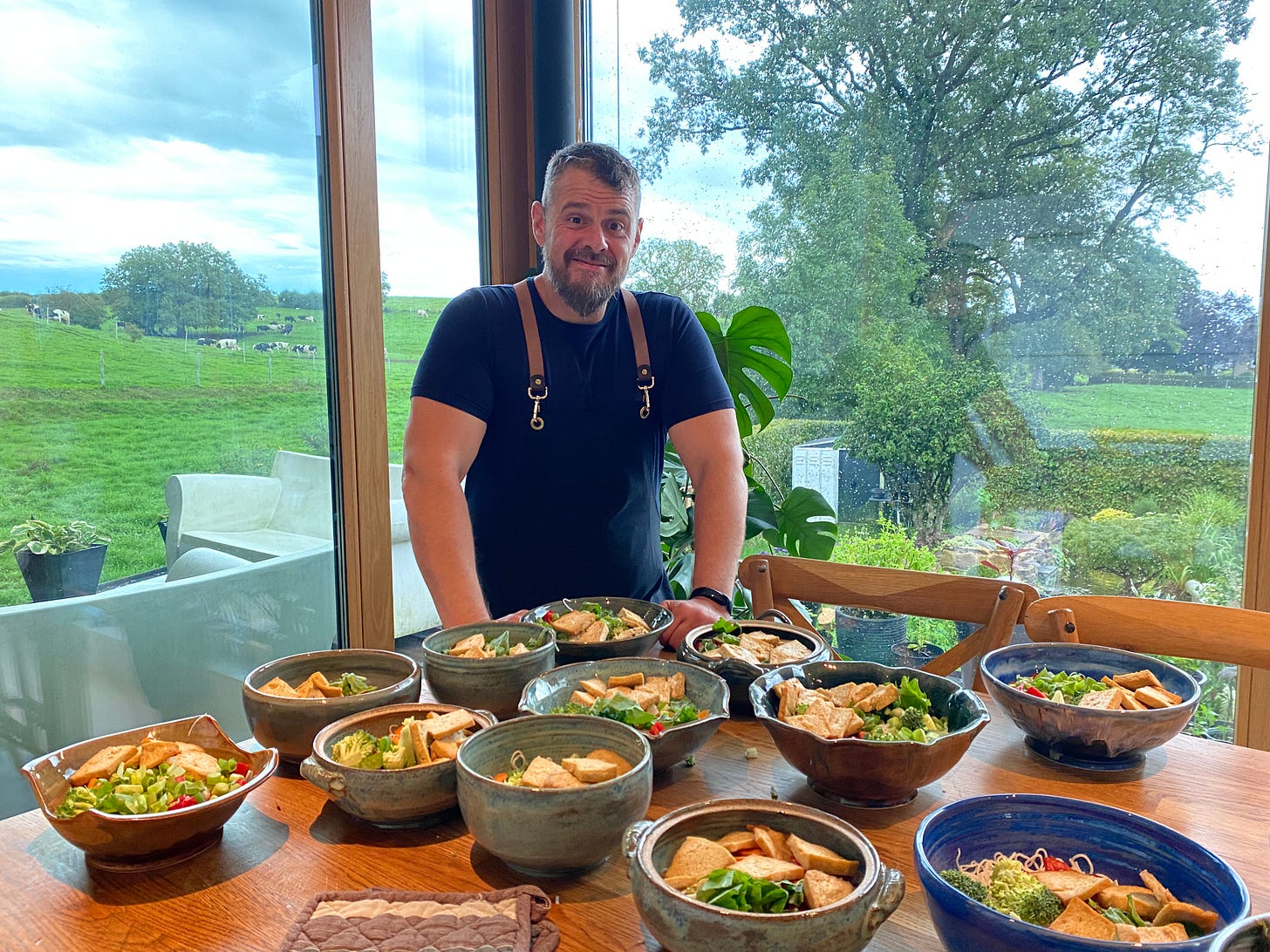
Everyone was quite positive — actually, very glowing — about the experience. Unusual for in-person Black Elephant parades, most of the guests stayed around for several hours to talk more. It was fascinating to hear their reactions and to see so many people (including my husband) discover what I’d gotten to discover a year ago.
It’s all really like a magical ritual, and feels quite ancient. Before screens, before books, and before even writing, we’d sit around for hours over food, talking, telling stories about ourselves. There are too few opportunities to do this now, but I suspect there will be many more as modernity becomes increasingly absurd and meaningless.
On Standing Aright
Two weekends ago, I quite seriously damaged my left erector spinae. As the name implies, it (or rather they, as it’s actually three separate muscles working together) are responsible for erecting your spine (that is, standing upright).
This was the first time I’d had this problem, and it was quite damn unpleasant. It also made deep breathing quite painful, wrecked my digestion, and made sleeping for more than a few hours at a time impossible.
The odd thing about this injury was the way I experienced the pain. When my husband, responding to my constant whinging and groaning, would ask if I was okay, I’d tell him, “it fucking really hurts, but I’m not unhappy.” In fact, I was actually quite happy, or at least very serene about it all.
I know precisely the moment the pain started, and it wasn’t from a gym injury. In fact, I even went back to the gym once during the recovery, but decided it was best not to push too hard. The injury — or better called, strain — was caused by another part of my body —my left shoulder — starting to heal.
For years, I’ve had trouble with that shoulder, mostly from hunching over a tiny laptop screen for days at a time. The position of your shoulders in such postures is called “internal rotation,” and its usefulness is to make your shoulders (the widest part of most bodies) smaller, so to squeeze into places and to help you reach behind you. Internal rotation is also the position you get into when you are scared, sad, or are bracing for a violent blow to the chest.
The opposite position, “external rotation,” widens your shoulders and causes your chest to look proud. It also helps you breathe deeper (by expanding the chest), and is the primary position you need to be in for most weight lifts. Over the past few months, I’d finally gotten the muscles that stabilize this position strong enough for it to become a default position. Unfortunately, I’d not adequately stretched any of the connecting muscles to help them adjust to the new posture.
That’s how it happened.
But also how it happened was that I was thinking too many of the thoughts I think that make me feel sad, beaten down, scared, and bracing for an inevitable blow. I was especially remembering all the ridiculous years of social media and in-person cancellations, the impossible-to-defend-against smears, and particularly the deep sense of betrayal by people whom I looked to as friends.
Those thoughts put you into that position, guarding your heart, almost as if trying to hug yourself, to tell yourself it’s okay. Remembering all that in the body brought on the strain, but it also brought with it an odd sense of release. It wasn’t the shoulder that hurt anymore, because it no longer felt like a heavy weight. Nothing was pushing me down: it was only the over-developed part of my back, that had tried to do the work of the shoulder for too long, finally realizing it could be right-sized again.
At the moment I’d understood this, when I could finally feel what precisely the problem was, I felt a relentless joy surge through me. I’d felt waves of it previously, in fact during lifts focused on back muscles, but now it was like a river coursing through me. Yeah, it all still fucking hurt, but I felt quite happy.
It’s mostly better now, and I’m quite glad of the experience.
On Being an Intellectual Bastard
Here Be Monsters comes out in three weeks, and I’m both quite excited and rather nervous in equal degrees.
It’s not my first book (it’s my eighth…), but it feels different because it’s the first book explicitly about leftism, rather than paganism or animism. That means its audience will be much broader, and its critics potentially more vicious.
I’ve been trying to figure out why I’m so nervous about this, which has meant asking myself a lot of questions that I wasn’t really ready to answer.
I’ll let you in, dear readers, on something I suspect is a secret but probably really isn’t. I’m sure you probably already know that I couldn’t afford university. I briefly went to a Christian college in Massachusetts on a scholarship, but I lost that funding once the administration found out I was a faggot.
It’s funny. I’ve several friends and a husband who constantly tell me I’m the smartest person they know. It’s sweet of them, and I sometimes believe them. The thing is, as bullshit as I believe the university imprimatur that says “you may speak intelligently” is, lacking it is the quickest way for many people to write you off completely.
This lack of official recognition has always felt like a bludgeon in many conversations involving academics. Once, at a party, an entire group of people suddenly broke off a conversation with me upon learning this. We were talking about theory, and one of them asked me where I’d gone for my graduate work. I hesitated, then said I’d never gotten an undergraduate degree.
It took them less than 30 seconds to scatter after that.
I think, ultimately, it’s a class signifier that I lack, which is of course completely fine with me. Yet, I also wondered if perhaps the really condescending behavior I experienced from those with that signifier has been a kind of self-protection for them.
One time, when discussing Walter Benjamin with several such sorts, the sense that I knew as much as the others — despite my lack of degree — seemed to really irritate them. I felt a bit sorry for them, imagining them calculating the six years of work and six figures of debt and asking if it had really been worth it.
So I take some solace in Caroline Ross’s recent essay, part of her series of letters to anonymous friends which always feel like you are that friend.
I know so many men who went to Oxford University, all writers. But here's a thing: Oxford removed a part of all the men I know who went there and stashed it in a secret vault to which they will almost never get access again. I watch these people walking around with a vital thing missing, and they go everywhere looking for it. The place they go the most is into books and writing, or in the case of one, writing and unassailable comedy. Very occasionally they go looking for it in a woman, 'The Muse'. I have experienced this first hand a couple of times. It took me a while to notice when they were unknowingly attempting to get a vital thing out of me and transplant it into themselves. Don't worry, I still have all my parts.
Perhaps the hidden, occult method by which 'Oxford' perpetuates the production of the intellectual elite, the creation of innovative ideas and the continuation of the 'striving mind' that does this, is by taking away the one thing that would give them peace: a peace that would mean they could, if they chose, live lives without the need to dissect everything, know everything, or lay bare the working of everything.
Her entire essay is quite beautiful, and she’s definitely on to something in her insights about the disconnect between the academic machine and culture itself:
So, their wonderful insights, propelled onward by this painful vacuity in their organisms, which each successive insight never fills, are not aligned with each other as would be in a true culture, but set against one another, ideas always in competition, never integrated. And shorn of the monastic, or other overarching integrative traditions of an extant culture, (and in universities that were once themselves only holons within a much greater whole of meaning-making, in this case, Christendom), these lack-filled-thought-bombs sit in a marketplace for people to pick up, trade or use. Often, they blow up when handled, spreading unstoppable clouds of cold void, and the users feel the hollowness that the Oxford involuntary-initiates feel, so the wider culture starts to chill, fragment, and then people start hitting each other with word clubs.
This is also how the culture war escaped the lab of universities and ended up infecting the whole world. The C-19 pandemic is an almost perfect analogy for the idea pandemic that is making people just as chronically ill. Ordinary people are correct to ask, 'Why were they experimenting with that in there? It's clearly dangerous, bad for health and could be weaponised!' No shit, Sherlock.
I highly recommend reading it in full.
On a Few Other Things
I’ll be talking about my book with that fantastic miscreant of all things esoteric, Gordon White, on a live YouTube broadcast. Gordon even made a pretty picture to go with it, but I feel bad that the Leviathan is trying to eat his head:
I’ll remind you again about it, but the best way to make sure you catch it live is to sign up for a YouTube alert (click on the little bell icon or “notify me”).
Also, go check out this essay just posted by Slippery Elm, which I cite in Here Be Monsters:
And a final note: the full video and transcript of my interview with the good folks of Fucking Cancelled is now available to the public.
More soon!
—Rhyd




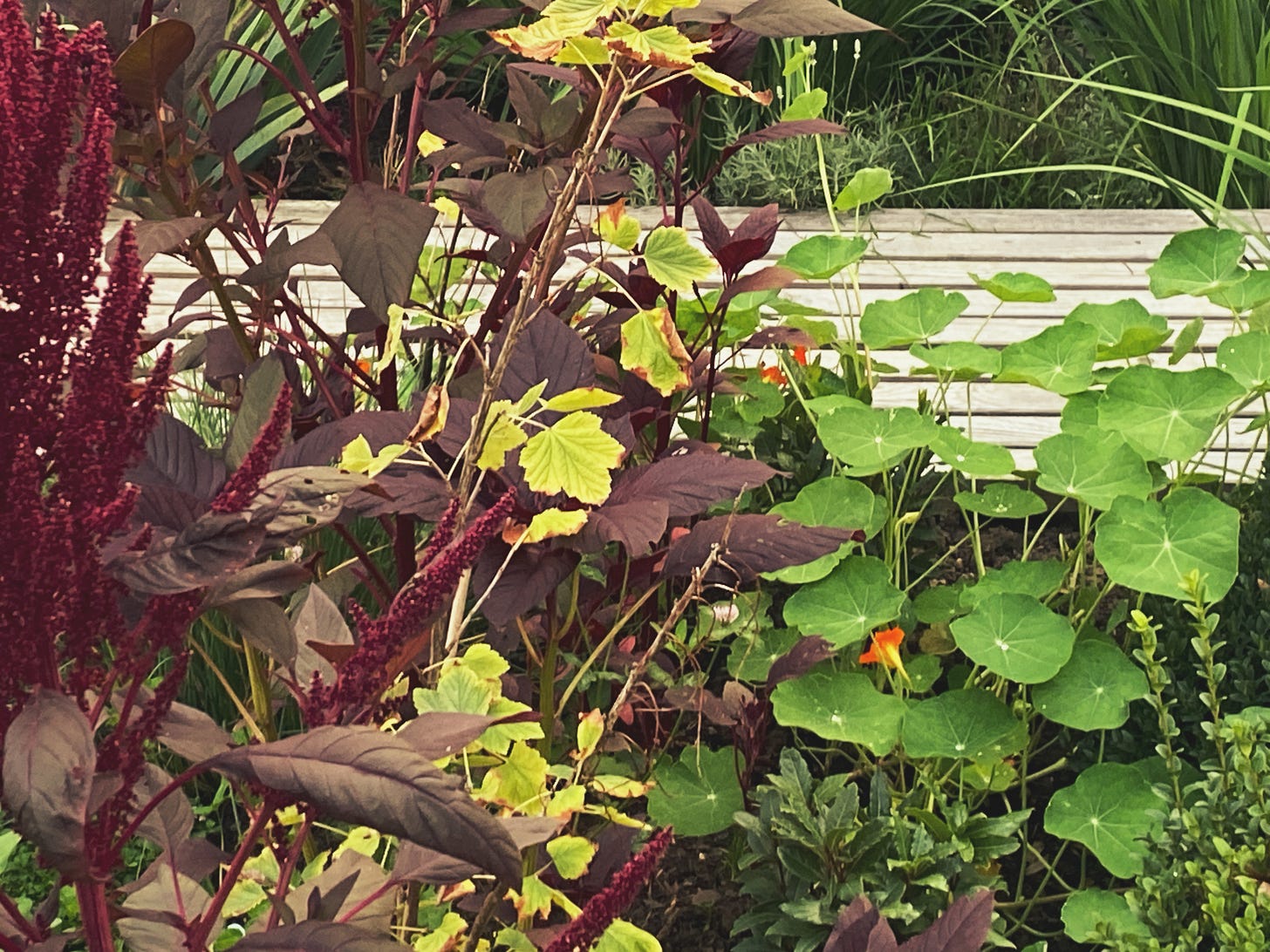
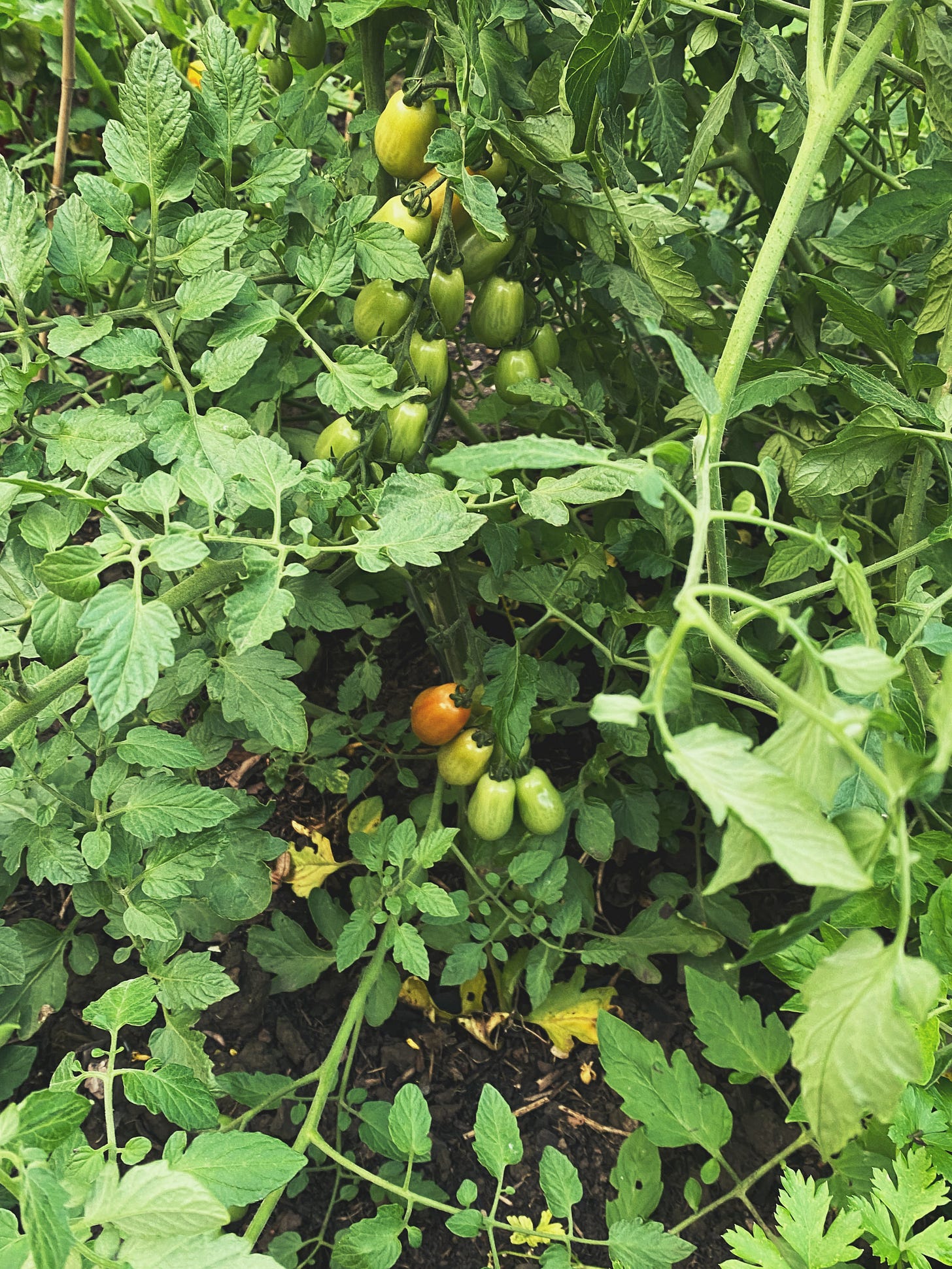
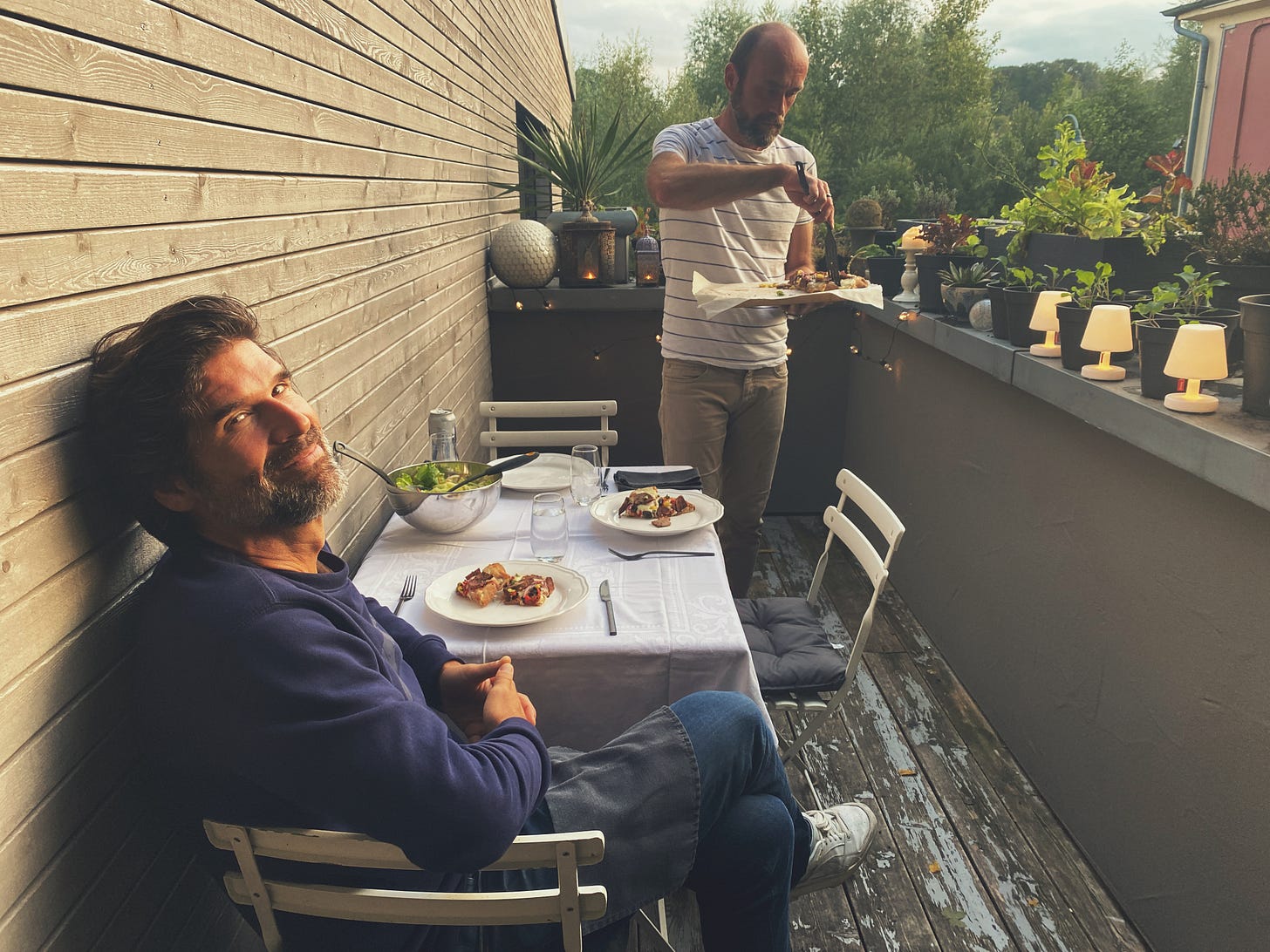

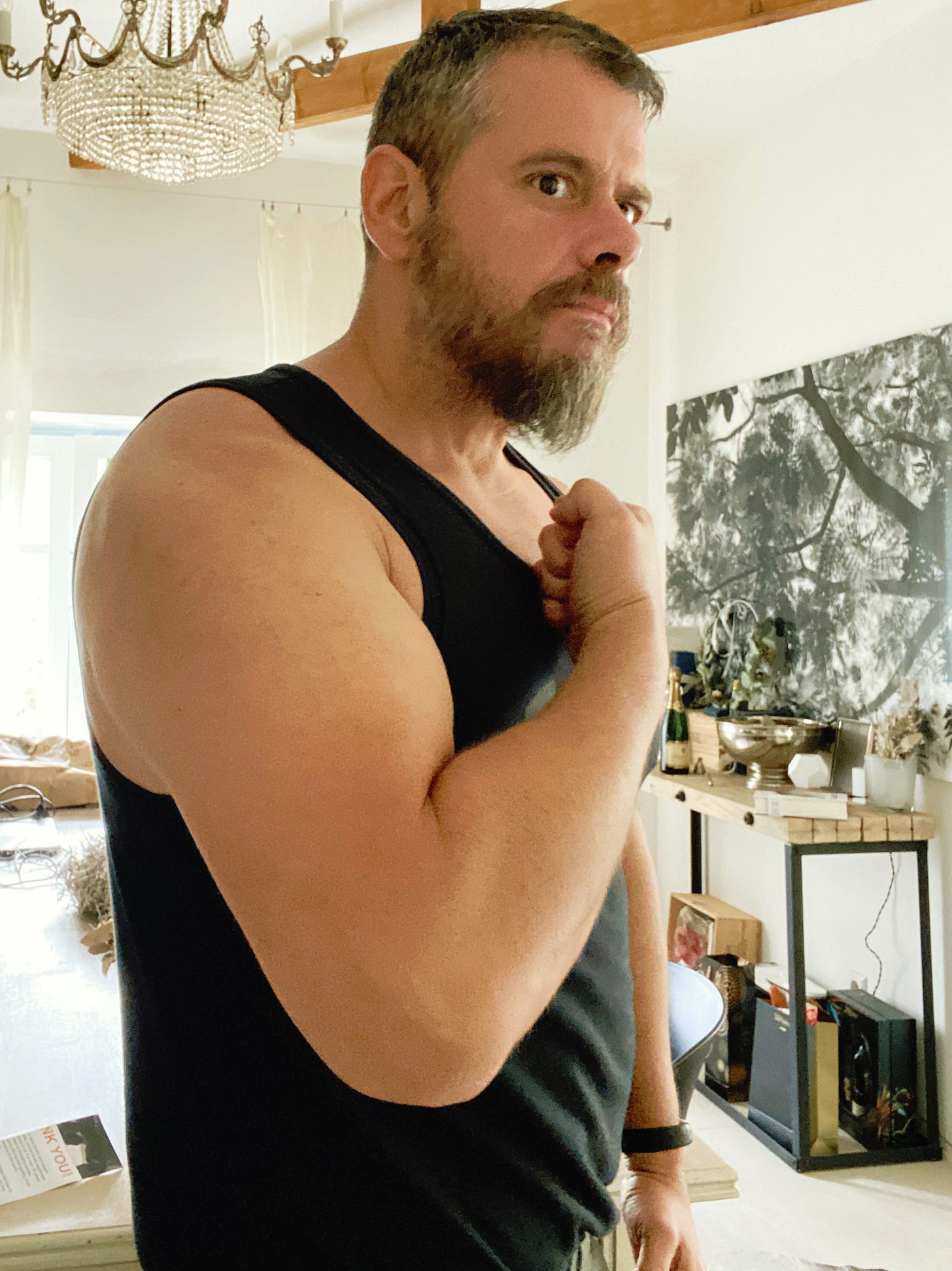
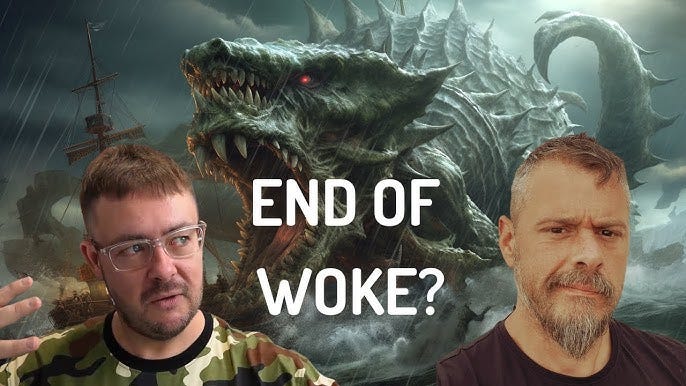

The University / bastard intellectual thing: I have ideas about this. From the outside, it seems to me that what Universities offer above all is a kind of protective structure; a framework to inhabit. To be as we are (Eula Biss calls it 'an essayist, a citizen thinker') is to be solitary, or at least to exist intellectually within webs of connection that are more organic, less formal; and with fewer / different rules. (It's a jungle out there, and when one's ideas or selfhood are attacked, there's no fortress to fall back to.)
The counterpoint- the benefit- is that the wild mind is more diverse. The autodidact's perspective, the true outsider's voice, is freer and stranger and often just as interesting, if not more interesting. Please forgive the self-promotion, but I wrote a tiny essay about this phenomenon, more or less the first thing I wrote on Substack:
https://rosiewhinray.substack.com/p/the-pupu-tarakihipaper-nautilus-method
Congrats on the book! I look forward to reading it!
Hope you are recovered soon from your injury. Your remarks here about the way in which physical injuries articulate emotional distress are very wise. And I love the snails! I had one for a pet, and they taught me so much.